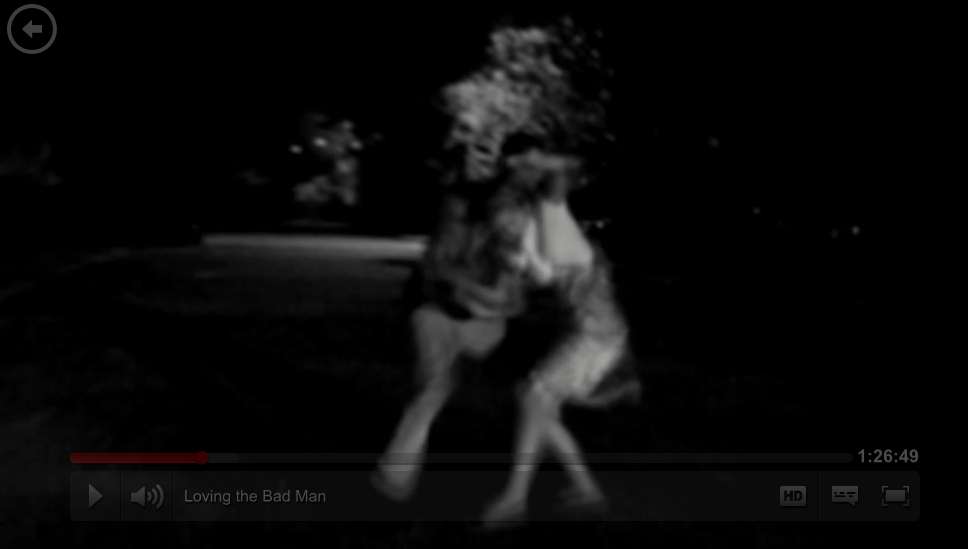The Patient: Loving the Bad Man
Writer/Director: Peter Engert
Medical History: Born in 2010. Serious Stephen Baldwin infestation. Has been passed around the Evangelical community. As of the time of this appointment, the film can be watched on Netflix Instant. The protagonist of the film is Julie Thompson, a 23-year-old virgin. When her tire goes flat, Mike (a troubled mechanic) stumbles off of his barstool to help her. Mike has some sort of flashback to his evil boss and rapes Julie, who quickly finds out she’s pregnant. Julie goes into labor as Mike goes to jail. Julie starts visiting Mike at the prison, bringing their young son. Yada, yada, yada, Mike’s hard heart is softened by Julie’s goodness and by Jesus. Trailer:
SCRIPT DOCTOR’S INITIAL NOTES:
I’d be violating that whole “don’t bear false witness thing” if I didn’t say that Loving the Bad Man is a sometimes confusing film that has major, major problems. (I think it’s fair to say that those who created the film wouldn’t want me to violate a commandment, right?) What is much more important is that I respond to the film according to some of my own KENmandments.
The First KENmandment: Thou shalt respect the beauty of the artistic impulse.
The men and women responsible for Loving the Bad Man seem to care very deeply about the film. Whether or not the movie is great, they shared a very special experience and worked together to tell a story that mattered to them.
The Second KENmandment: Thou shalt evaluate a work according to its specific goals.
Mr. Engert and his cast and crew seem to want to evangelize their religion and concept of faith to others. I am perfectly willing to believe that Loving the Bad Man successfully touched the hearts of many people.
The Third KENmandment: Thou shalt try not to be a jerk to other artists unless there’s a really good reason to do so.
Mr. Engert has never spit on my car and the film doesn’t endorse any dogmatic positions that may be “problematic.” So why should I lay into the gentleman’s work in an unpleasant manner? We’re all artists and are subject to literary criticism, but it shouldn’t get personal unless there’s a good reason.
DIAGNOSIS/TREATMENT:
First Act Problems
There are some pretty big flaws in the first act of Loving the Bad Man. The characters are extremely simple. Mike the Rapist is bad. His boss is super mean. Julie is good and nice. Mr. Engert does not allow shades of gray into the characterization. Julie is 23 and works in a supermarket. Not that there’s anything wrong with it, but we get no sense of what she intends for the larger scope of her life. She has two good parents…it seems they would probably have worked with her on that before the age of 23. And if not, why not? Mike beats up the mean boss and there are witnesses, but there are no repercussions. Why not?
The turning point of Act One is Julie’s rape. It occurs at the perfect time: 16 minutes in. (In case you didn’t know, “turning point” is a screenwriting term. Look up Syd Field.) Now, including such a sad event in your work can get you a lot of pathos. Any kind of rape story or anything involving harming children certainly makes me Insta-sad. But here’s the problem. We’re only told that poor Julie is raped. I’m certainly not suggesting the filmmakers include a fifty-minute scene of the whole encounter, but the viewer must piece things together from being TOLD, not shown. Here is the worst that we are shown:
Like I said, I don’t need to see a super graphic scene to understand what is happening to Julie. But in a movie whose whole premise depends upon her being impregnated by rape, it seems appropriate to show just a little more. Compare this scene from Loving the Bad Man to the very powerful scene near the beginning of Breaking the Waves in which Emily Watson loses her virginity. It’s just a very tight close-up on the actress’s face. We know exactly what is happening and exactly how the character feels and what the experience means to her.
The next scene depicts the parents finding Julie’s car parked askew on the lawn and Julie is passed out behind some bushes. The filmmakers expect us to believe that a young woman is passed out for several hours in the front yard of a suburban home in full view of the street and no one has said anything? (The Bystander Effect is strong, but not that strong.) Oh, and the father—justifiably furious—drives by the scene of the crime the next day and what was a desolate street with zero traffic is now a bustling thoroughfare.
Immediately after that, Julie has dinner with her family at a picnic table. Her mother emerges from the home, stricken. This happens:
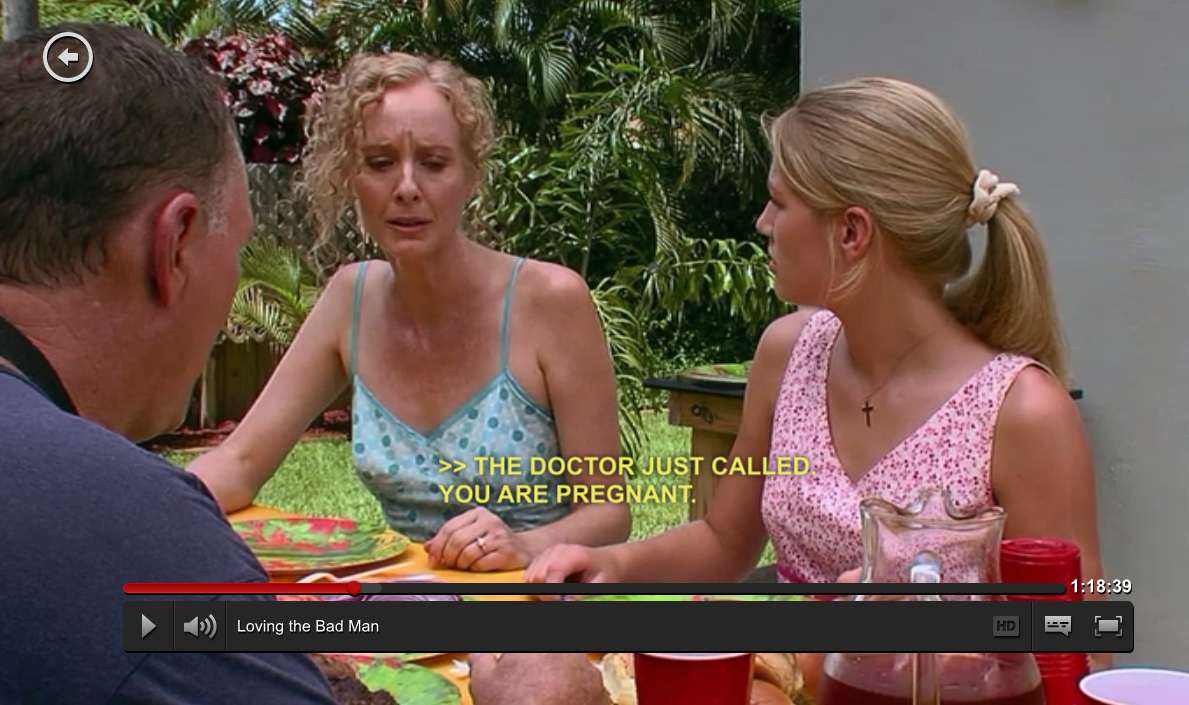 It’s my understanding that it’s wildly illegal for a medical-type-person to disclose this kind of information to a parent, particularly considering the patient is 23. Why did this problem occur? Perhaps because Mr. Engert had to get that information out somehow and a scene in a doctor’s office might have slowed things down; the outside dinner scene also serves to establish the father’s anger at Julie and the kindness of Cole, the “good man” who wants to do mission work and serves as contrast to Mike the Rapist. Oh, and perhaps most importantly, the parents instantly suggest Julie abort the baby and Julie instantly decides not to. Is this the way important decisions are made by real people?
It’s my understanding that it’s wildly illegal for a medical-type-person to disclose this kind of information to a parent, particularly considering the patient is 23. Why did this problem occur? Perhaps because Mr. Engert had to get that information out somehow and a scene in a doctor’s office might have slowed things down; the outside dinner scene also serves to establish the father’s anger at Julie and the kindness of Cole, the “good man” who wants to do mission work and serves as contrast to Mike the Rapist. Oh, and perhaps most importantly, the parents instantly suggest Julie abort the baby and Julie instantly decides not to. Is this the way important decisions are made by real people?
Immediately after this scene, the audience gets this:
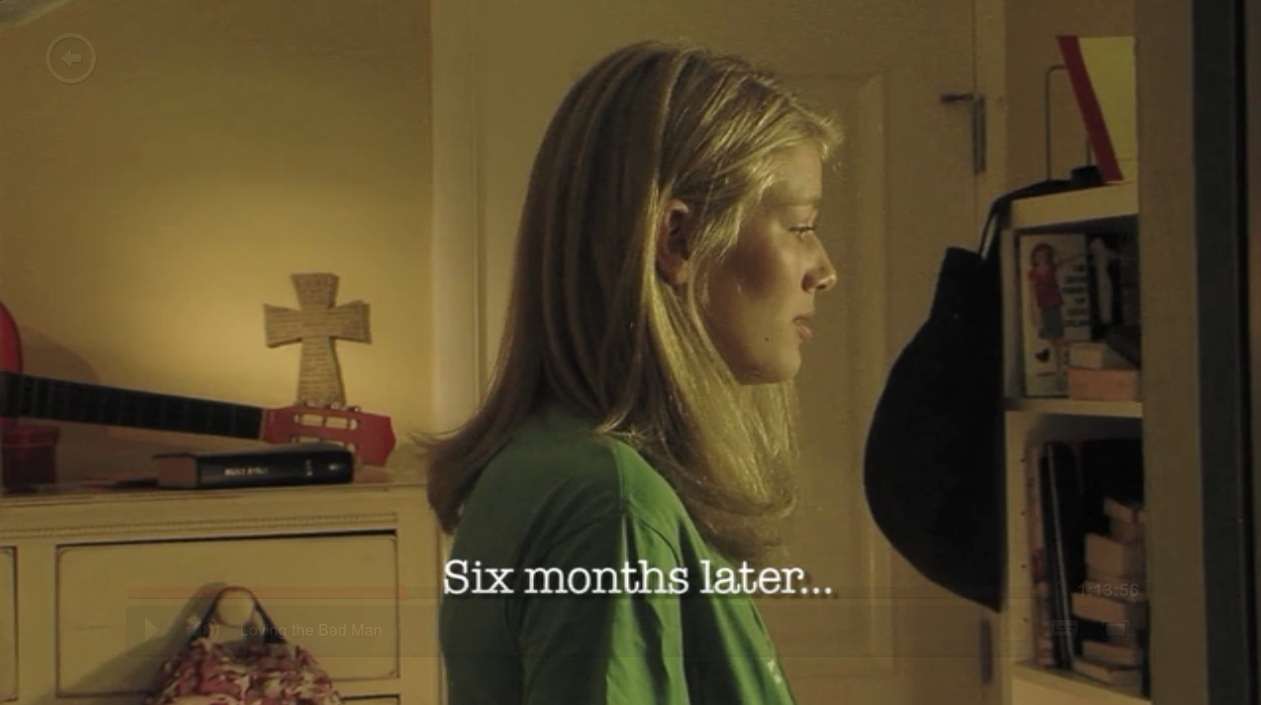 …then one minute later, Julie’s having her baby:
…then one minute later, Julie’s having her baby:
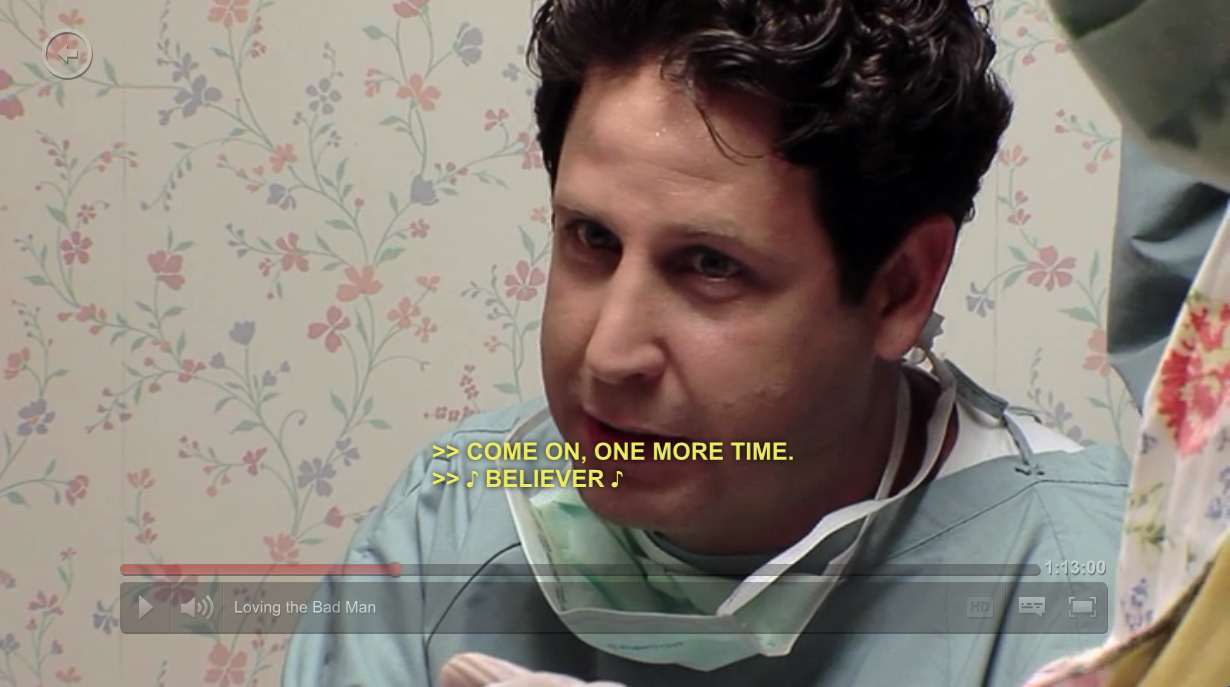 That was fast! I love that the birth scene is intercut with the scenes of Mike going to prison (even being examined by the prison doctor), but Mr. Engert is jumping around too much and making us do too much math.
That was fast! I love that the birth scene is intercut with the scenes of Mike going to prison (even being examined by the prison doctor), but Mr. Engert is jumping around too much and making us do too much math.
Is the baby premature? I don’t believe the characters say so later.
Did it take three months for a rape victim to determine she is pregnant?
Has the gestation period of human beings changed recently?
As a bachelor in his thirties and a writer, I don’t like doing math and I’m not entirely familiar with all of the ins and outs of human reproduction.
DIAGNOSIS/RECOMMENDED TREATMENT:
It’s my professional opinion that THIS is where the movie really should begin. This is not a movie about a woman having a baby, so don’t waste half an hour of screen time getting there. It’s intended to be a story about the redemption of an evil man and a triumph of a righteous woman. What exposition was released in Act One that couldn’t be released elsewhere in the story? Not much. As it stands, Mike already has flashbacks of the rape. The father has scenes in Act Two in which he takes his anger out on Julie and the baby. The audience loses nothing if you just lop off those first thirty minutes.
Simplistic Epiphanies
It takes an awful lot of page space and several experiences for Jean Valjean to cast off the anger that is weighing him down. His epiphany is complicated and ongoing. He even needs at least two tune-ups after his incident with Petit Picpus. (Admitting he is Jean Valjean and atoning for casting Fantine away.)
This is not the case in Loving the Bad Man. How do you forgive the man who raped you, took your virginity and impregnated you? Why, you put the baby to sleep, cry a little and then look at the cross on your wall. Then this happens:
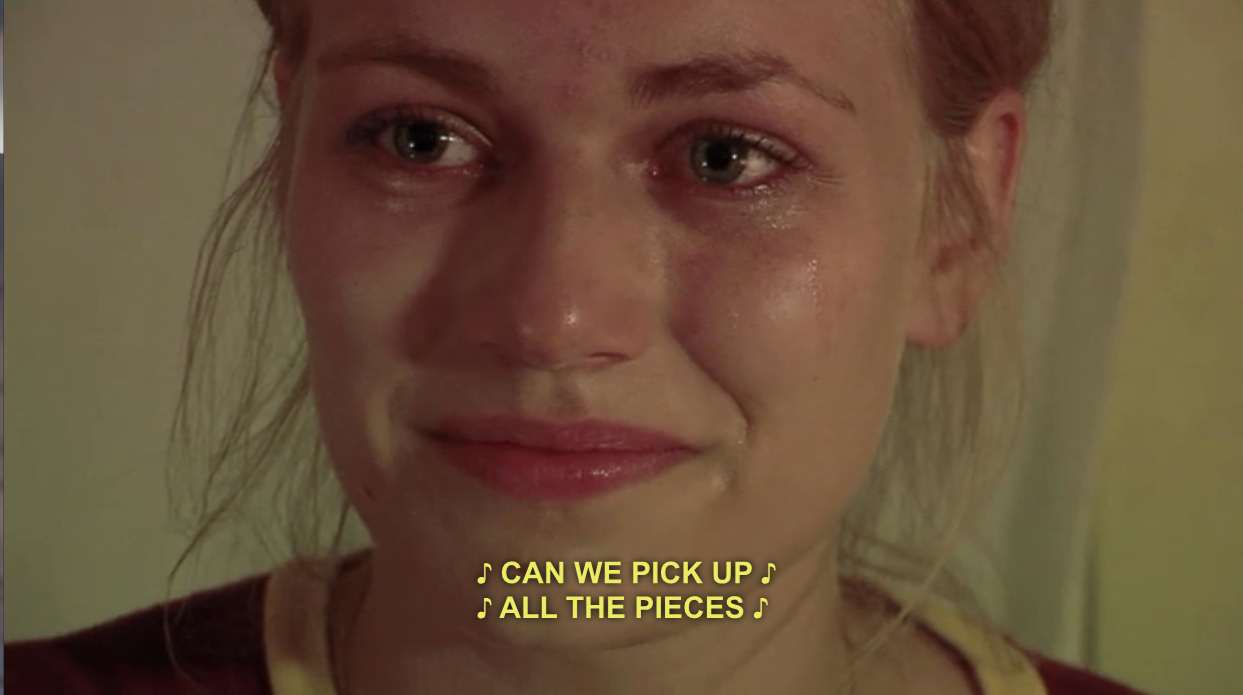 After that, you are ready to bring your baby to meet his rapist father and have called “bygones” on what happened. Is forgiveness really that easy? So quick? Even if the viewer can’t imagine bringing the baby to prison to see his father, we want to like Julie and we want to feel for her, but these actions just don’t seem realistic. Epiphanies are not easy.
After that, you are ready to bring your baby to meet his rapist father and have called “bygones” on what happened. Is forgiveness really that easy? So quick? Even if the viewer can’t imagine bringing the baby to prison to see his father, we want to like Julie and we want to feel for her, but these actions just don’t seem realistic. Epiphanies are not easy.
Unless they begin Act Three, apparently. Do I believe a rapist can feel guilt? Of course. But Mike doesn’t gain catharsis by begging Julie for forgiveness. He doesn’t write a thousand letters of apology to her. His epiphany comes when he reads the Bible passages that Julie marked in the book she gave him. See?
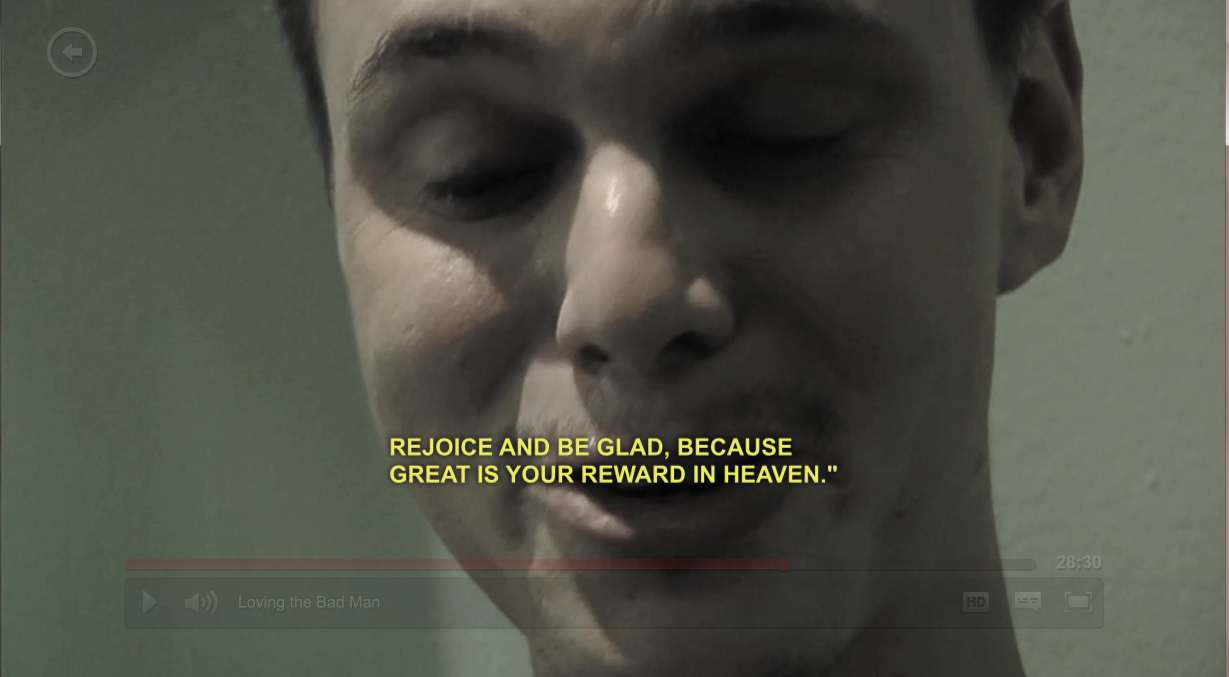 In Les Miserables, atonement was a big struggle for Jean Valjean and resulted in the poor guy repaying everyone possible. When Javert has his own epiphany, he commits suicide out of guilt for what he has done to subvert real justice and because he realizes he has lived in a fantasy world for decades.
In Les Miserables, atonement was a big struggle for Jean Valjean and resulted in the poor guy repaying everyone possible. When Javert has his own epiphany, he commits suicide out of guilt for what he has done to subvert real justice and because he realizes he has lived in a fantasy world for decades.
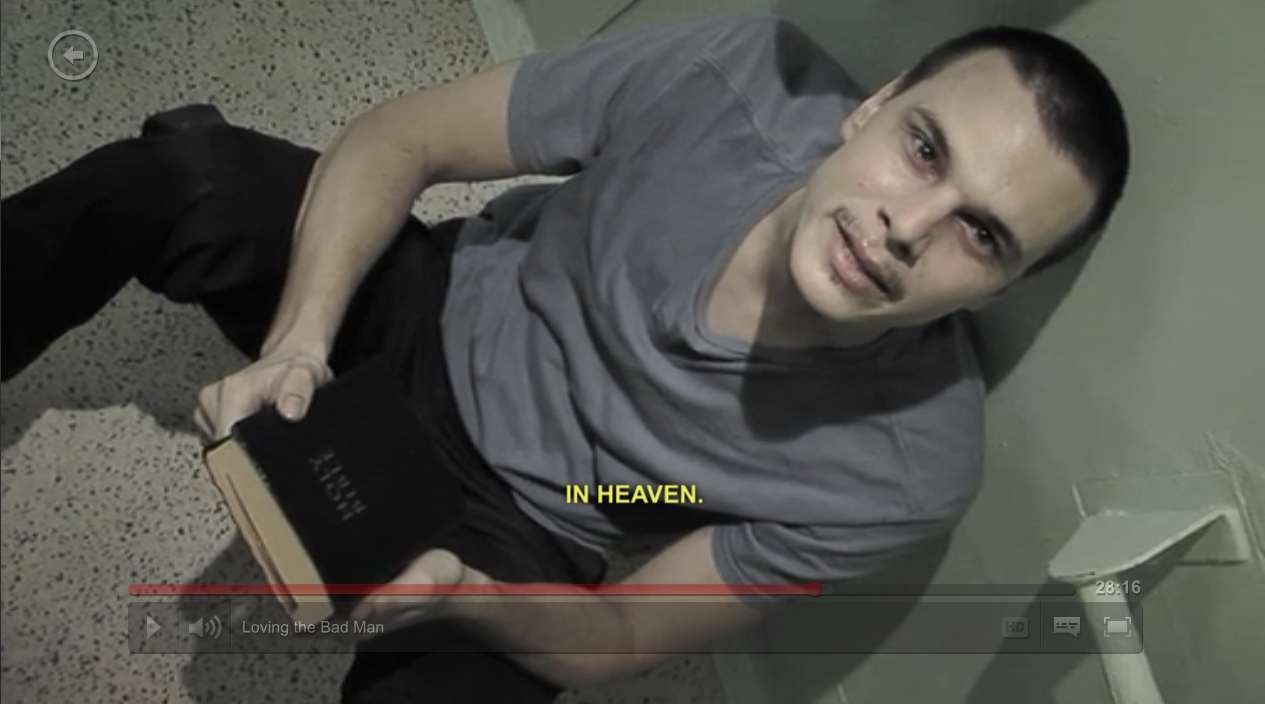
Remember, this is after several unsolicited visits from the woman he raped. We haven’t seen him break down and apologize or perform any acts of contrition or anything.
DIAGNOSIS/RECOMMENDED TREATMENT:
The process must be more difficult and uncomfortable for both Julie and Mike. Yes, I understand that Mr. Engert wants to make the Bible and Jesus a big part of it, and that’s fine. But complicated emotions and circumstances require a more complicated depiction. Julie must be more conflicted about meeting with her rapist (instead of appearing excited and joyful to be doing so from the start) and Mike must manifest the weight of his guilt a lot more if we’re really to feel a lot at the end of the film.
A Confusing Title and Some Things Don’t Make Sense
The title Loving the Bad Man implies that Julie loves her rapist, right? I guess I can buy it on a woman-comes-to-forgive-and-moves-on basis. But from the title alone, I thought there was going to be some romance between the two. Is it just me, or would that be a bridge too far? According to the title, who is being told to love and who must be loved? The bad guys in the prison are way worse people than Mike.
At one point, the father has purchased and is installing a car seat. Julie and her mother look on and laugh; he’s bought “the wrong one.” Julie owns a regular sedan; are there child car seats that won’t work in a…you know…a car?
Julie gets kicked out of the house because her father is upset about the “bastard” child. She immediately seems to have found an apartment. Where did she go that night? Do we get enough of the father’s point of view to understand his anger, or is it simply a convenient plot point?
Why does Julie have zero anger or fear or any compunction whatsoever about visiting Mike in the prison? She also instantly assumes Mike will be super jazzed to see her and a baby. I get that Julie is supposed to be a good person, but this doesn’t seem realistic.
I can’t help but point out Stephen Baldwin’s fake tattoos. In case you weren’t aware, “88” is a big thing for white supremacist/neo-Nazi types. The eighth letter in the alphabet is H. “HH” = “Heil Hitler.” (I learned that from the controversy surrounding what’s her name who was with Jesse James.)
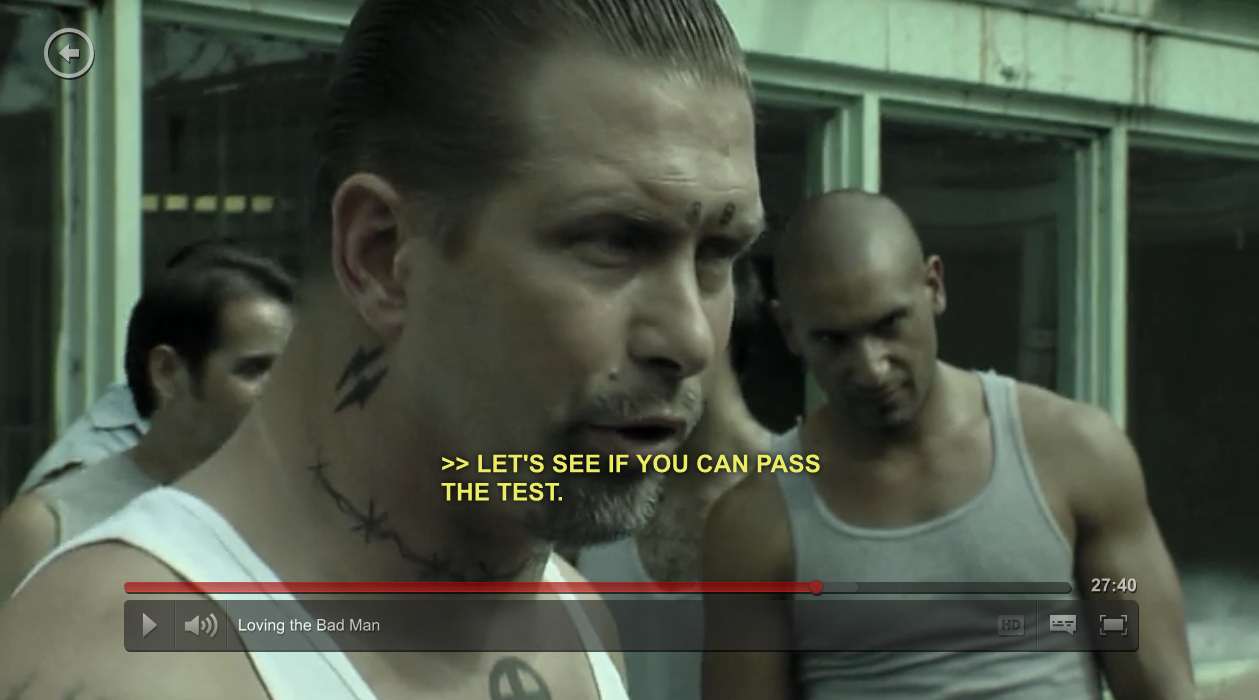 DIAGNOSIS/RECOMMENDED TREATMENT:
DIAGNOSIS/RECOMMENDED TREATMENT:
I dunno. Change those things a little?
The Unrequited Love Elephant in the Room
Before I retired from pursuing romantic relationships (all my fault, I hasten to point out), I found myself on the unfortunate end of many situations in which my affection was unrequited. Don’t we all have these experiences from time to time? Well, I related strongly to Cole, a too-perfect guy who worked with Julie, ostensibly before she had to quit to have and care for her baby. in the third act, Cole is the manager of the store. After Julie is told at the prison that she can’t visit the man who raped her, she tearfully heads to the store, hoping for Cole to reassure her and show her some kindness.
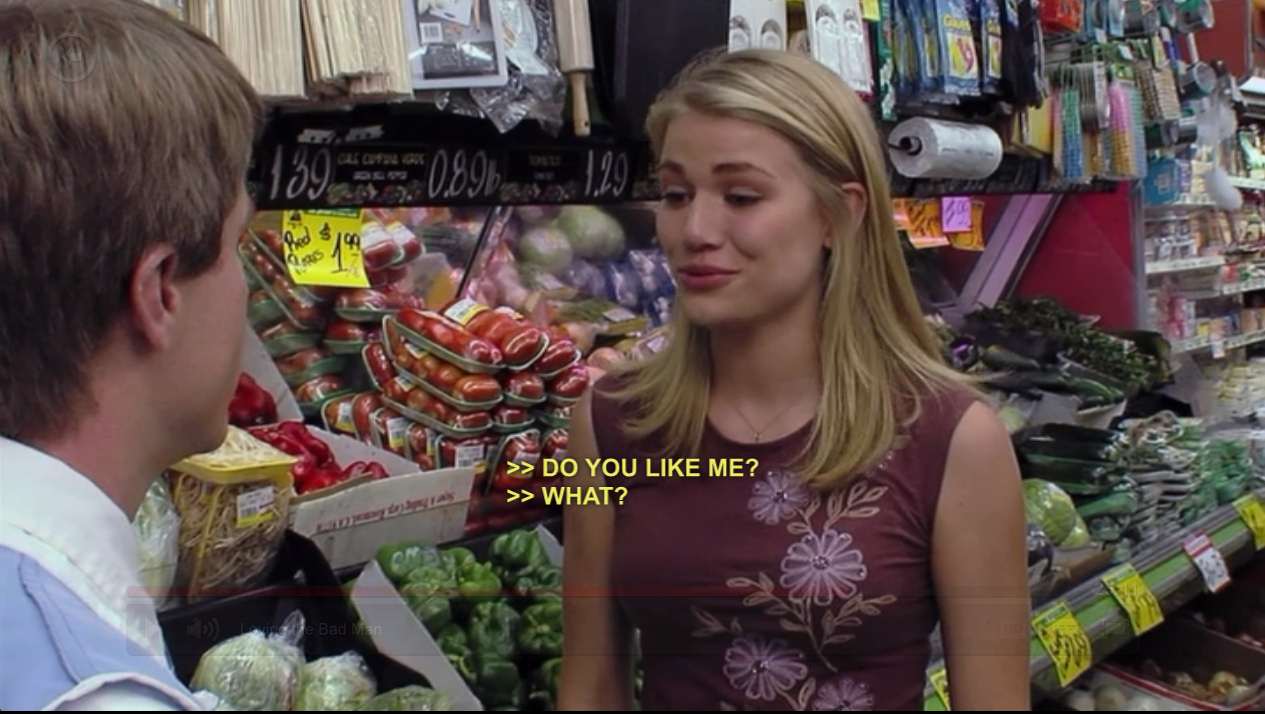 Poor Julie is breaking down because her family is rebelling against her and life is just getting very, very tough. Cole, of course, is happy to lend her his incredibly absorbent shoulder.
Poor Julie is breaking down because her family is rebelling against her and life is just getting very, very tough. Cole, of course, is happy to lend her his incredibly absorbent shoulder.
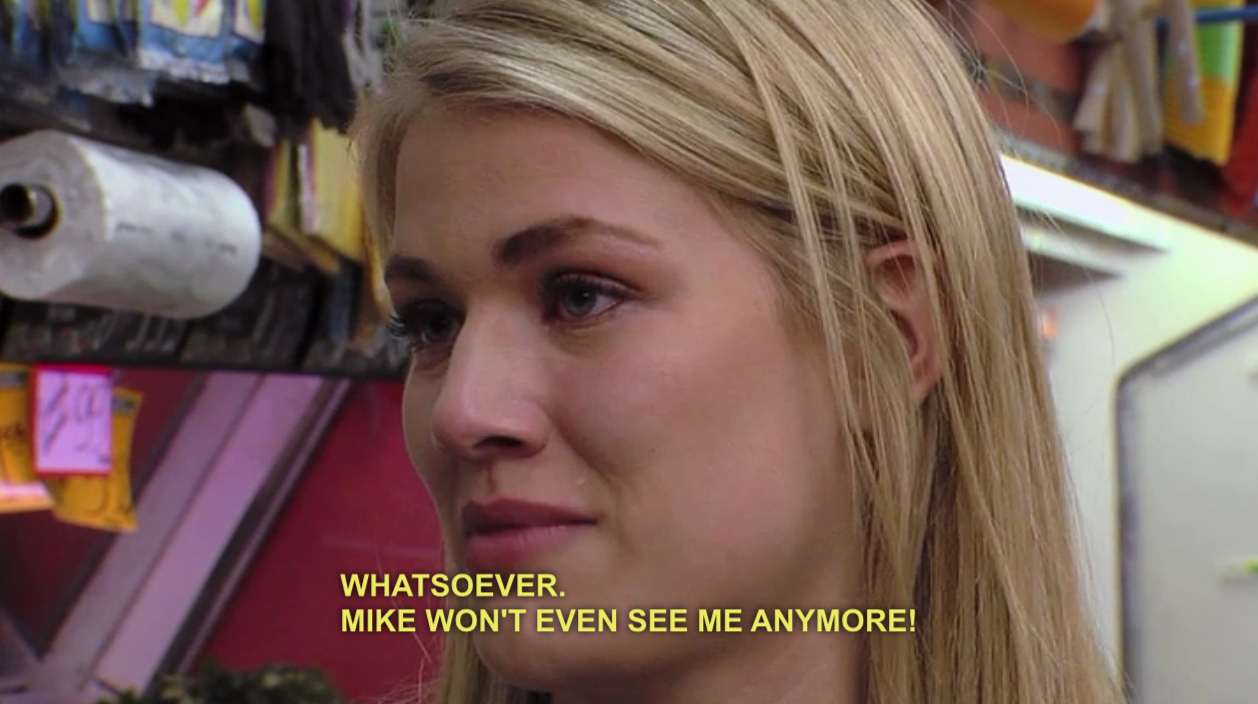 Who’s that on the what now? Julie is lamenting that even her rapist has seemingly turned his back on her. (He’s in the infirmary after being stabbed in the stomach, but the guard wouldn’t tell her that.) I am willing to believe that people are capable of just about anything, but we need to be prepared for this kind of thought.
Who’s that on the what now? Julie is lamenting that even her rapist has seemingly turned his back on her. (He’s in the infirmary after being stabbed in the stomach, but the guard wouldn’t tell her that.) I am willing to believe that people are capable of just about anything, but we need to be prepared for this kind of thought.
Here’s my main point, and maybe it’s a personal one. Whether intentionally or not, the film treats Mike the Rapist far more kindly than it does Cole the Grocery Guy.
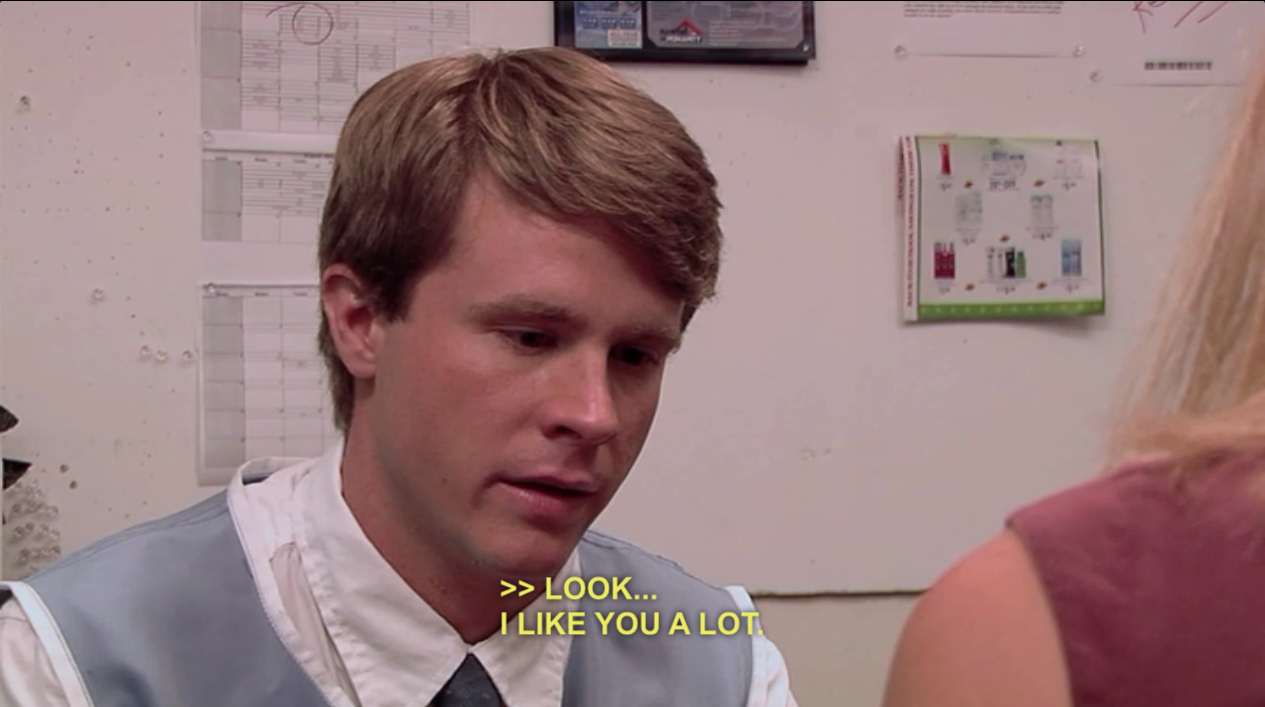
Never say it out loud, bro. Put it in a short story! Lemme know if you want to talk. We’ll order a pizza and watch a Tigers game.
This is supposed to be a story about Mike’s redemption, but Mr. Engert introduced this thread of the story, too. As one of Mike’s friends points out, families come in all kinds of configurations. Perhaps Cole would adopt the baby and give Julie a four-person family. I kept waiting for Julie to treat Cole with more kindness than Mike, but it never happened. At one point, she mentions that the two are “talking about it” or something, but come on. (And we never see it.) (And the closing title sequence suggests that she and Cole don’t get together.)
DIAGNOSIS/RECOMMENDED TREATMENT:
If you’re not going to pay off Cole’s narrative, cut him out or eliminate his crush on Julie. I know it’s tough because he facilitates a lot of the redemption stuff with the father, but this is the primary problem of the film. These characters should be real people with real lives that occur off-screen. Instead, it seems that Cole is put into stasis until the story needs him. We shouldn’t ask any big questions in our work that we’re not willing to answer.
SUMMATION:
The characters in our work should be put ahead of the message we are trying to convey. They are a vehicle toward enhanced understanding. And I don’t want to give away the ending, but let’s just say that reading a letter from a person is not a very satisfying denouement. The final moments of the film should have established the new conditions of everyone’s lives and provided catharsis for the audience.
